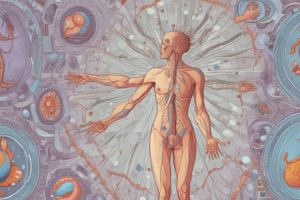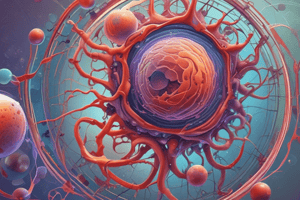Podcast
Questions and Answers
What is the main function of the immune system?
What is the main function of the immune system?
- Maintaining homeostasis and preventing infection (correct)
- Filtering the blood to remove toxins
- Producing hormones for the body
- Digesting food and absorbing nutrients
Which statement is true about the immune system's role in preventing infection?
Which statement is true about the immune system's role in preventing infection?
- It assists in the absorption of nutrients in the digestive system
- It primarily functions in regulating heart rate and blood pressure
- It directly attacks all foreign substances in the body
- It produces antibodies and activates immune cells to prevent infection (correct)
What is the significance of the immune system regulating its response?
What is the significance of the immune system regulating its response?
- Preventing hair loss
- Avoiding muscle fatigue
- Preventing overactive or underactive immune responses (correct)
- Maintaining body temperature
Which term refers to foreign substances that the immune system recognizes and destroys?
Which term refers to foreign substances that the immune system recognizes and destroys?
What is one of the essential components of human biology discussed in the text?
What is one of the essential components of human biology discussed in the text?
Which of the following is not a cell type of the immune system mentioned in the text?
Which of the following is not a cell type of the immune system mentioned in the text?
Which cells are responsible for producing antibodies and are classified into two main types?
Which cells are responsible for producing antibodies and are classified into two main types?
What type of immunity is associated with T-lymphocytes?
What type of immunity is associated with T-lymphocytes?
Which cells are involved in the immune response against viruses and cancer cells?
Which cells are involved in the immune response against viruses and cancer cells?
What is the primary function of phagocytic cells?
What is the primary function of phagocytic cells?
Which disorder is characterized by the immune system mistakenly attacking the body's own tissues?
Which disorder is characterized by the immune system mistakenly attacking the body's own tissues?
Which condition leads to an overreaction of the immune system to harmless substances?
Which condition leads to an overreaction of the immune system to harmless substances?
What is the term for conditions where the immune system is unable to function properly?
What is the term for conditions where the immune system is unable to function properly?
Which type of immunity is associated with B-lymphocytes?
Which type of immunity is associated with B-lymphocytes?
What is the main role of T-lymphocytes in the immune system?
What is the main role of T-lymphocytes in the immune system?
Which disorders affect the immune system and lead to increased susceptibility to infections?
Which disorders affect the immune system and lead to increased susceptibility to infections?
Flashcards are hidden until you start studying
Study Notes
Introduction
Human biology is a broad field that encompasses various aspects of our anatomy, physiology, and pathology. One of the essential components of human biology is immunology, the study of the immune system and its function in maintaining the health and well-being of the human body. This article will provide a comprehensive overview of human immunology, focusing on the functions, cell types, and disorders of the immune system.
Functions of the Immune System
The immune system plays a crucial role in protecting the human body from pathogens and maintaining homeostasis. It consists of various organs, tissues, and cells that work together to:
-
Identify and eliminate pathogens: The immune system recognizes and destroys foreign substances, such as bacteria, viruses, parasites, and fungi, which can cause infection and disease.
-
Prevent infection: The immune system produces antibodies and activates immune cells to prevent infection and reinfection.
-
Regulate the immune response: The immune system regulates its response to prevent overactive or underactive immune responses, which can lead to inflammation, autoimmune diseases, or immunodeficiencies.
Cell Types of the Immune System
The immune system comprises a diverse range of cell types, including:
-
Lymphocytes: These are the most important cells of the immune system, responsible for producing antibodies and recognizing specific antigens. Lymphocytes are classified into two main types:
- B-lymphocytes: These cells produce antibodies and are responsible for humoral immunity.
- T-lymphocytes: These cells play a key role in cell-mediated immunity and can either destroy infected cells or help other immune cells to do so.
-
Phagocytic cells: These cells engulf and destroy pathogens, including neutrophils, monocytes, and macrophages.
-
Natural killer cells: These cells are involved in the immune response against viruses and cancer cells.
Disorders of the Immune System
Several disorders can affect the immune system, leading to various health issues. Some of the most common immune system disorders include:
-
Allergies: Overreaction of the immune system to harmless substances, leading to symptoms such as sneezing, itching, and swelling.
-
Autoimmune diseases: Conditions where the immune system mistakenly attacks the body's own tissues, causing inflammation and damage. Examples include rheumatoid arthritis, lupus, and multiple sclerosis.
-
Immunodeficiencies: Conditions where the immune system is unable to function properly, leading to increased susceptibility to infections. Examples include AIDS, severe combined immunodeficiency (SCID), and primary immunodeficiency diseases.
Conclusion
Immunology is a vital component of human biology, focusing on the functions, cell types, and disorders of the immune system. Understanding the immune system helps in the prevention, diagnosis, and treatment of various diseases and infections. By studying immunology, we can gain insights into the complex interactions between the immune system and the environment, ultimately leading to a better understanding of human health and well-being.
Studying That Suits You
Use AI to generate personalized quizzes and flashcards to suit your learning preferences.




